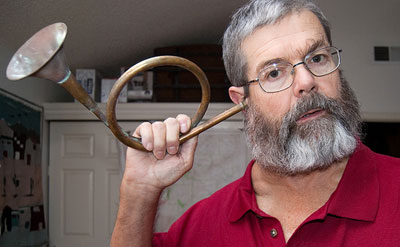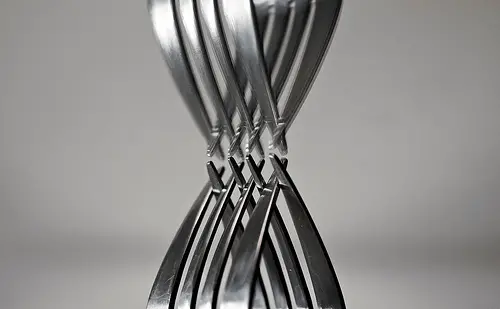
 Photo by Paul Garland
Photo by Paul GarlandThe history and origin of the hearing aid goes further back than you may imagine. Being able to hear is something most of us take for granted, but for those of you that have trouble with hearing, you’ve certainly learned to appreciate it.
The hearing aid device was developed essentially to do what it sounds like. It helps aid someone in hearing better. The first literary reference to a hearing aid device was by Homer where he spoke of a special speaking trumpet in Iliad.
The First Man Made Hearing Aid
The first known man made hearing aid device was actually called an auditory tube or an ear trumpet. This device was made by the early Greek scientist Alcmaeon of Croton in 550 B.C.
This type of hearing aid wasn’t really developed to help aid in hearing, but was more focused on helping people hear better at long distances. They were commonly used by folks that were out at sea during war times as well as during hunting expeditions.
Sometime around 300 B.C. ancient Greeks imported seashells into Phoenicia that were used as ear trumpets. These shells went through a process of hardening and were then covered in a coat of paint. The paint was really nothing more than a marketing scheme to make them more presentable.
The Modern Ear Trumpet
Bevan of London is known as the first British developer of the ear trumpet, made in 1715. Then by 1790 Alessandro Volta, the maker of the electric battery, made a discovery. He found that the human auditory system was capable of being stimulated by electric current. This discovery came as quite a shock, because he found this out by inserting metal rods into his own ear and gave himself an electric shock of 50 volts!
According to Volta he heard sounds similar to that of thick boiling soup after receiving the shock.
The Modern Hearing Aid
The modern hearing aid was developed on a principal used by earlier developers. These early hearing aids used a carbon microphone which was constructed by the Dictograph Company of the United States back in 1898.
It wasn’t until 1954 that the hearing aid became small enough to be built into glasses frames, this eventually led to the “in the ear” digital hearing aid that was introduced in 1995.
Cochlear Implant Breakthrough
The first cochlear implant was done by Rod Saunders in Melbourne, Australia. But the true pioneer of this technology was Professor Graeme Clark during the 1970s.
Many people like to refer to the cochlear implant as the bionic ear, mainly because this procedure involves the device being implanted within the ear. But not everyone is a candidate for the cochlear implant, it is intended for those with extreme hearing problems.
Much like some of the earlier experiments in the development of the hearing aid, the cochlear implant works by stimulating the auditory nerves by way of electrical impulses. It wasn’t until 1984 that the FDA approved the first cochlear implant to be carried out in the United States.
Medical advances are constantly evolving and new technologies are always coming on the scene, so no telling where the hearing aid will be in the future. Who knows, eventually we may not even need the hearing aid, it may be a simple matter of an inner ear transplant.
Can you believe that hearing aid technology and research goes back to 550 B.C. ? I suppose that as long as man has been on this Earth there has always been research on how to repair or make them better.



Collection of your information is good
nice your site thanks for sharing love you all team good work keep it up
Thanks for reading, I’m glad you enjoy the blog.
Hey, thank you so much for the information about hearing aids. I am writing a report on hearing loss for school, and this information is great for my report. I didn’t know that the first device used as a hearing aid was called an ear trumpet. I find learning about this kind of stuff fascinating.
Hey Ted, glad you found some useful information to help with your report. There are so many great and interesting things out there that we normally take for granted, it’s quite fun to ponder some of them from time to time. Good luck on the report!
I am with Ted on this one, I found this to be very interesting. It is going to be so interesting to see what the future holds in store for hearing aids. They have really improved so much over the past couple of years alone. Thanks a lot for this information though.
No doubt Edmond…I’m sure at some point if not already, hearing aids will be implanted and not even visible from the outside at all. But like I say, if it’s not already approved technology, then I’m sure it soon will be. Thanks for reading 🙂
It’s really crazy to see how hearing loss solutions have changed over the years. Of course, I’m definitely happen I don’t live in the age of ear trumpets. Cochlear implants are amazing to me and I’m excited to see them more widespread for a bunch of people. Thanks for sharing Robert!
Absolutely Gerald, and thank you for stopping by for a read! Technology truly is amazing, it’s good to see some of it is going toward helping the handicapped and not all towards games and entertainment. 🙂
I think you’re absolutely right. While entertainment is great, I’m sure there are so many other applications for the technology we have today that could really improve people’s lives.
Why did that guy stick a rod of electricity into his ear? That sounds like it would have been painful, and the sound of bubbling soup he heard was probably because he boiled his blood. At least what he did helped learn something for hearing aids today.
lol, yah that really was a wacky experiment I have to say. It’s amazing what some people will do in the name of research.. Lucky for us there’s some wild people out there to do it for us!
How neat that the early hearing aid dates back to 550 B.C. The cool thing about hearing aids is that to get them to work, you don’t fully need electronics . The electronics enhance the sound. All you need is something deep in the ear canal that can pull in sound at a high rate. I am sure that Alcmaeon of Croton would be proud if he knew what he ended up influencing the creation of.
Hey Bryan, thanks for stopping by and commenting. I agree Croton would of been very proud. I’m sure he never could of imagined where the hearing aid would evolve to…
I am so glad that technology has come so far in recent years. The developments in medicine have made so many people’s lives so much easier. The hearing aid would be an especially useful tool for keeping up the quality of life even late into life. Interesting article!